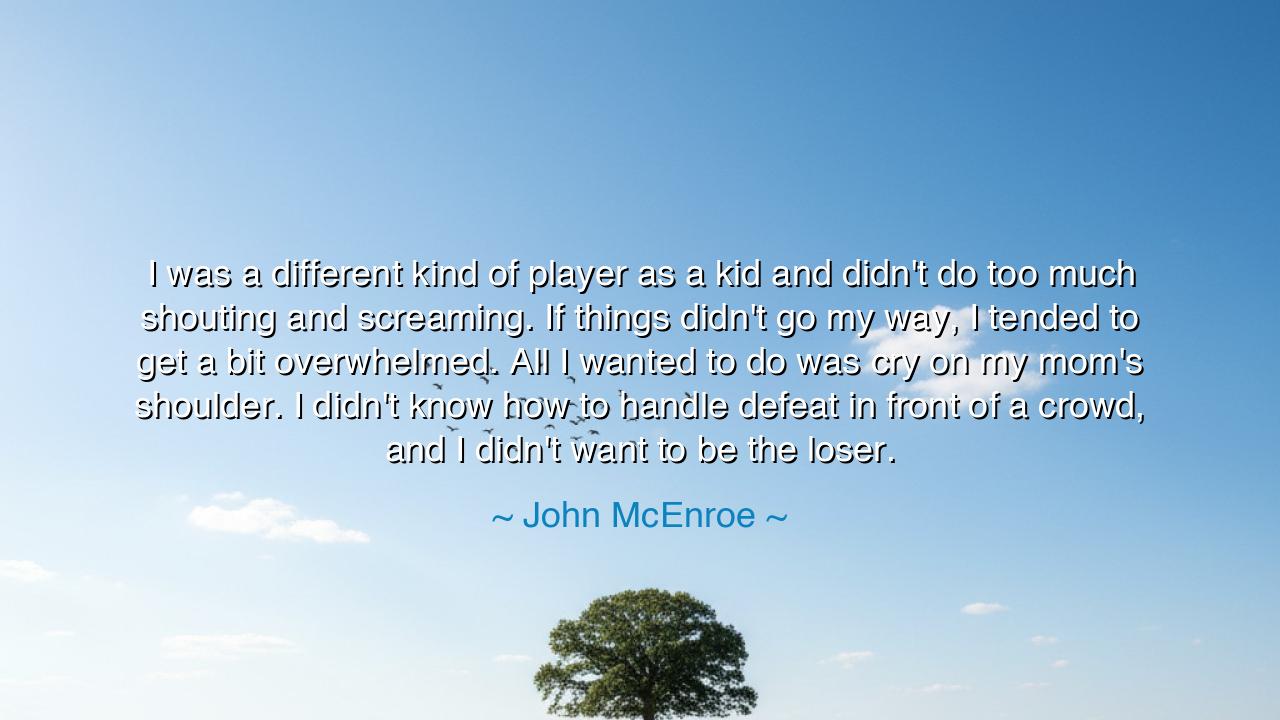
I was a different kind of player as a kid and didn't do too much
I was a different kind of player as a kid and didn't do too much shouting and screaming. If things didn't go my way, I tended to get a bit overwhelmed. All I wanted to do was cry on my mom's shoulder. I didn't know how to handle defeat in front of a crowd, and I didn't want to be the loser.






John McEnroe, fierce competitor and fiery soul of tennis, once revealed the hidden softness beneath his warrior’s mask: “I was a different kind of player as a kid and didn’t do too much shouting and screaming. If things didn’t go my way, I tended to get a bit overwhelmed. All I wanted to do was cry on my mom’s shoulder. I didn’t know how to handle defeat in front of a crowd, and I didn’t want to be the loser.” These words strike with power, for they remind us that even the strongest champions were once children struggling to face the weight of loss.
The ancients understood this tension between victory and defeat. To them, the field of battle, the arena, or the Olympic stadium was not merely a place of contest but a crucible of the soul. A young athlete who feels shame at losing is not weak, but human; for what burns within him is not cowardice, but the longing for honor. McEnroe’s yearning for his mother’s embrace shows that greatness is born not in indifference, but in deep sensitivity. The child who feels defeat so strongly is the same child who, once tempered, will rise to chase victory with unbreakable fire.
Consider the tale of Achilles, the mightiest warrior of the Greeks. In his youth he was fierce yet fragile, prone to great bursts of rage when wounded in pride. When slighted by Agamemnon, he withdrew from battle not because he lacked courage, but because he could not yet master his emotions. Like McEnroe as a boy, he was overwhelmed, not by fear of fighting, but by the unbearable taste of dishonor. Yet it was this same fire, once refined, that made Achilles legendary.
McEnroe’s words also reveal the weight of the crowd. To lose privately is painful; to lose before the gaze of many can feel unbearable. This too was known in the days of Rome, when gladiators faced not only their opponents but also the judgment of thousands. Defeat was not just the end of a match; it was the end of a reputation. McEnroe as a child felt this same burning shame—not wanting to be branded “the loser” in the eyes of others. This fear is universal, for every human longs not only for success, but for dignity.
But there is also here a hidden lesson: the child who cried at defeat learned to transform his sorrow into strength. For in time McEnroe became famous not for tears but for the thunder of his presence, his refusal to bow quietly to loss, his fire on the court. The boy who once sought comfort grew into a man who met defeat face to face and turned it into fuel for greater triumphs. This journey from fragility to resilience is the true path of the athlete, and indeed of every soul.
The lesson is clear: we must not despise our tears, nor shame our younger selves for struggling with defeat. It is through these early stumblings that we learn to rise stronger. A child overwhelmed by loss may one day grow into a champion precisely because they felt so deeply. Sensitivity, when guided, becomes passion; and passion, when disciplined, becomes greatness.
Therefore, take these words to heart: when you face your own defeats, do not bury your feelings nor drown in them. Acknowledge them, but do not be ruled by them. Let every loss teach you not what you cannot do, but what you can yet become. Seek comfort when you need it, but return to the field with renewed fire. For the story of John McEnroe teaches us this eternal truth: defeat is not the end, but the forge in which champions are made.






AAdministratorAdministrator
Welcome, honored guests. Please leave a comment, we will respond soon